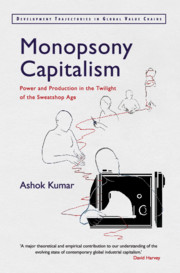2 - The Global Sweatshop
from PAST
Published online by Cambridge University Press: 15 January 2020
Summary
In 2005, the late Neil Kearney, then General Secretary of the International Textile, Garment, and Leather Workers’ Federation (ITGLWF), delivered a series of speeches under the banner ‘Life beyond Codes’. Kearney drew attention to the losses the garment workers had experienced over the previous decade, during which real wages had fallen by 25 per cent and working hours had risen by 25 per cent to an average of 60 hours a week. He painted a ‘pretty depressing picture’ of the existing governance regimes (ITGLWF 2007). ‘Ten years of corporate code of conduct application,’ Kearney proclaimed, ‘had brought little change to workplaces, with conditions often worse than they were a decade ago. […] Now the time has come to be looking at “life beyond codes”.’ Neil Kearney's personal evolution, as a banker turned garment sector union leader, is not incongruent in a regime of ‘social models’ where structural antagonisms are blurred, and the emphasis is placed on class cooperation. Nonetheless, Kearney recognized the profound restructuring global capitalism had undergone since the late 1960s and the consequent need for labour to globalize its own strategies in response. For Kearney and the ITGLWF's case, this meant globalizing the ‘social partnership model’.
As outlined in Chapter 1, contemporaneous with the rise of globalization, new initiatives emerged to counter the fragmentation of state-based trade unions and the increased fluidity of capital in an attempt to globalize workers’ rights. Top-down initiatives, often face-saving measures for TNCs, included consumer-led campaigns driven by NGOs, in addition to efforts by supranational bodies such as the International Labour Organization (ILO) and World Bank. Global North garment trade unions responded to globalization with two different types of transnational countervailing strategies: the Global Union Federation (GUF)– initiated global framework agreements (GFAs) and the US-led anti-sweatshop strategies.
In Europe, capital and labour confrontation became a compromise and was bound up with a strong state regulatory apparatus. But in North America, more specifically the US but later also Canada, where regulations were comparatively weak, the International Ladies’ Garment Workers’ Union (ILGWU) was nonetheless successful and overcame many of the same hurdles that mark today's globalized epoch. Two irreconcilable garment worker trade union strategies grew out of Europe's partnerships versus US antagonistic models.
Both European and North American approaches to tackling globalization's consequences in the garment industry fell under the ‘global governance’ regime of the 1990s, but utilized very different tactics.
- Type
- Chapter
- Information
- Monopsony CapitalismPower and Production in the Twilight of the Sweatshop Age, pp. 52 - 86Publisher: Cambridge University PressPrint publication year: 2020



